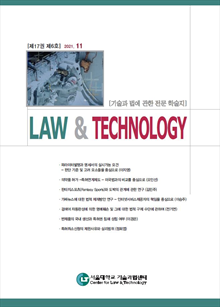간행물
LAW & TECHNOLOGY

- 발행기관 서울대학교 기술과법센터
- 자료유형 학술지
- 간기 격월간
- ISSN 1738-7434 (Print)
- 수록기간 2005 ~ 2022
- 주제분류 사회과학 > 법학 사회과학 분류의 다른 간행물
- 십진분류KDC 360DDC 340
권호리스트/논문검색
제4권 제4호 통권 제19호 (2008년 7월) 7건
1.
2008.07
구독 인증기관 무료, 개인회원 유료
최근 사회 전반에 걸쳐 인터넷 포털 사이트의 명예훼손 책임에 대한 논의가 주요 이슈로 등장하고 있다. 주로 문제되는 것은 포털 사이트의 뉴스게재와 게시물 방치로 인한 불법행위 책임의 성립여부이다. 이러한 논의는 인터넷 포털 사이트가 과연 언론에 해당하는지 여부에 대한 논의와도 깊은 연관성을 가지고 있다. 본고에서는 인터넷 포털 사이트의 명예훼손 책임에 대한 미국과 일본의 입법 및 판례이론을 살펴보고, 이를 통해 포털 사이트의 책임범위 확정과 관련하여 각국에서 제시하고 있는 면책기준들을 검토한다. 이어서 포털 사이트의 명예훼손 책임과 관련된 국내의 법령들을 간략히 살펴본 후, 우리나라 판례의 태도를 심층적으로 검토한다. 먼저 인터넷 사이트 게시판을 통한 명예훼손과 관련된 과거 대법원의 판결들을 검토한 후, 포탈 사이트의 명예훼손 책임을 정면으로 다룬 이른바「억울하게 죽은 내 딸」사건(서울고등법원 2008. 7. 2. 선고 2007나60990 판결) 을 중심으로 국내 판례에서 제시하고 있는 포털 사이트의 명예훼손 책임 기준을 검토한다. 아울러 위「억울하게 죽은 내 딸」사건에서 촉발된 법리적 논쟁들에 대한 개별적인 검토를 끝으로 본고를 마무리 한다.
4,800원
2.
2008.07
구독 인증기관 무료, 개인회원 유료
The legal regulation about the derivative(or secondary) liability of OSP(Online Service Provider) is
briefly divided into two parts, liability requirement and liability limitation requirement. In the OSPs’liability requirement portion, Korean courts in Sori-Bada cases has pointed out that joint tort-feasors rule in the clause (3) of article 760 of the Korean Civil Act should be the statutory ground for OSPs liability requirement. Korea Copyright Act has also the article 104 which is a peculiar and even weird provision. It imposes the duty to implement a specific technology measure upon a so-called specific type of ISPs and therefore the article can be another statutory ground for OSPs liability requirement. Moreover, when interpreting the article 104 in the preliminary injunction cases related to Sori-Bada version 5, the Seoul High Court concluded that P2P service providers should adopt so-called the positive filtering system. At first, it seems to be more reasonable to rescind article 104 in future amendments of the Act. It’s because the scope of article 104 is so ambiguous that it may be improperly expanded to almost all OSPs and the article 104 creates unnecessary anti-market manipulation by government. Second, the Seoul High Court’s position is unreasonable. It’s because the liability limitation clauses of Korean Copyright Act are basically based on negative filtering principle, and so-called the positive filtering system is not consistent with Korea-US Free Trade Agreement and the development of filtering technology is not perfect enough to enforce the adoption of the technology. Turning to the OSPs’liability limitation requirement, article 102 and 103 of Korean Copyright Act sets up a liability limitation requirement similar to the Notice and Takedown procedure in the DMCA. It would be appropriate to amend the act in following 2 ways. At first, the Korean Copyright Act had better implement the specific requirement according to the type of information technology, such as caching, hosting, search engine, etc. even though the present act has only a uniform immunity requirement for all type of OSP. Second, the effect related to OSP’s immunity is now no more than discretional mitigation or exemption and should be changed to mandatory exemption. The legal regulation about online service user’s direct liability includes two main issues; Users’ fair use right and the criminal penalty for direct infringement. At first, the statutory and more comprehensive provision of fair use for individual users should be added into Korean Copyright Act, to keep the balance between copyright owner’s protection and the others’ fair use right. Second, the criminal penalty for users’ copyright infringement should be restrained from the rampant misuse which even caused one Korean teenager’s suicide. The new proposal in 2008 by government to amend the present Copyright Act seems to be inappropriate because it is only based on excessive administrative opportunism which would result in excessive restriction on OSPs and severe legal vagueness. Rather, it would be better for the legislature to promote the cooperation between thecopyright owners and OSPs. As anexample, the system similar to the subpoena in DMCA can be establishedin Korean Copyright Act if it will be carefully managed by Korean judicial branch.
6,900원
3.
2008.07
구독 인증기관 무료, 개인회원 유료
“Patent Troll”은 2000년대 초반 미국의 닷컴(dot-com) 기업의 몰락, 특허중시(pro-patent)정책, 소프트웨어 등 첨단산업기술의 발전과 관련 발명에 대한 특허출원의 급증 및 불완전한 특허심사제도 등을 배경으로 등장하였고, 미국과는 기술발전 속도, 특허제도 및 발명자의 보호에 있어 차이가 있는 우리나라에서도 그러한 현상의 발생가능성에 대한 우려가 높아지고 있다. “Patent Troll”은 그 개념에 포함되어야 할 행위 또는 행위자의 범위가 불명확하고, 원래 특허법에 정해진 권리를 행사하는 것이라는 점에서 그 규제 여부에 관하여 논란이 있으나, Patent Troll의 행위로 인하여 혁신의 촉진 등 특허제도의 목적 달성에 장애를 초래하는 행위유형이 존재할 수 있다는 점에서 이에 대한 대응방법을 마련할 필요가 있다. 그러한 대응방법의 하나로서 미국에서는 특허권 남용(Patent Misuse)의 법리가 들어지나 그러한 법리가 발전되지 않은 우리나라에서는 민법상의 권리남용의 법리를 적용할 수 있을 것이고, 특히 특허권자의 특허권침해금지청구에 대하여 권리남용의 법리를 적용함에 있어서는 금지명령으로 인하여 받을 침해자측의 불이익, 특허의 무효가능성, 특허권자의 특허발명 실시여부, 특허권의 행사로 인하여 일반 공중이 입게 될 불이익 등을 고려하여 판단해야 할 것이다. 또한 Patent Troll에 의한 특허권 침해로 인한 손해배상액을 산정함에 있어서는 특허권자가 스스로 발명을 실시하지 않는 점 및 특허가 침해품의 수요에 기여하는 비율 등을 참작하여야 할 것이다. 나아가 Patent Troll의 발생을 억지하기 위해서는 영업방법발명 등 새로운 유형의 발명에 대응할 수 있는 구체적인 특허심사기준을 마련하고 심사관의 역량을 강화하며, 특허침해 여부의 판단의 전제가 되는 청구범위의 해석과 관련하여 균등의 범위를 적정하게 설정하고, 패소한 당사자에 대하여 실질적으로 소요된 비용을 기초로 소송비용을 부담하게 하며, 심결취소소송과 침해소송의 관할이 분리되어 있는 현재의 이원적 소송구조는 Patent Troll에 의하여 악용될 소지가 있고 비효율적이므로 특허소송의 관할을 통합하여야 할 것이다.
8,700원
주요 판례 해설
4.
2008.07
구독 인증기관 무료, 개인회원 유료
4,000원
5.
2008.07
구독 인증기관 무료, 개인회원 유료
4,000원
해외 동향
6.
2008.07
구독 인증기관 무료, 개인회원 유료
3,000원
7.
2008.07
구독 인증기관 무료, 개인회원 유료
4,000원

